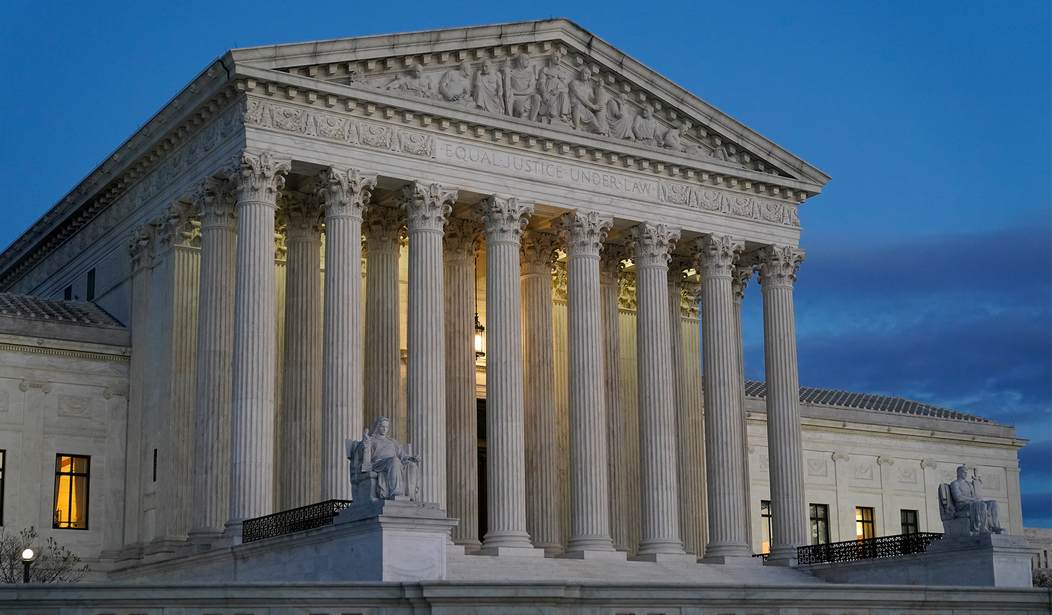In an effort to provide a brief overview of Supreme Court decisions, several of which are likely to be fairly consequential, I've been catching us up on the 18 opinions handed down thus far for the 2023 term. And, for those keeping track of these sorts of things, of those 18, 15 have been 9-0/unanimous decisions. Of the three dissents thus far, two were along party lines, one was not.
READ MORE:
The Skinny on SCOTUS (2023 Term - December-February)
The Skinny on SCOTUS (2023 Term - March)
The Skinny on SCOTUS (2023 Term - April - Part 1)
As indicated previously, there are roughly 40 more decisions anticipated for the term, so we've got a long way to go. If you're one of those folks who's interested in what SCOTUS is up to but don't have the time (or mental energy) to read and digest each opinion as it's handed down, then hopefully, you'll find this little endeavor of assistance.
April 2024 Decisions (Part 2)
Date: April 16, 2024
Author: Thomas
Split: 9-0
Dissent: N/A
Appeal From: Fifth Circuit
Basic Facts:
Richard DeVillier and more than 120 other petitioners own property north of U. S. Interstate Highway 10 between Houston and Beaumont, Texas. The dispute here arose after the State of Texas took action to use portions of I–10 as a flood evacuation route, installing a roughly 3-foot-tall barrier along the highway median to act as a dam. When subsequent hurricanes and storms brought heavy rainfall, the median barrier performed as intended, keeping the south side of the highway open. But it also flooded petitioners’ land to the north, causing significant damage to their property. DeVillier filed suit in Texas state court. He alleged that by building the median barrier and using his property to store stormwater, Texas had effected a taking of his property for which the State must pay just compensation. Other property owners filed similar suits. Texas removed the cases to federal court, where they were consolidated into a single proceeding with one operative complaint. The operative complaint includes inverse-condemnation claims under both the Texas Constitution and the Takings Clause of the Fifth Amendment. As relevant, Texas moved to dismiss the federal inverse-condemnation claim, arguing that a plaintiff has no cause of action arising directly under the Takings Clause. The District Court denied Texas’ motion, concluding that a property owner may sue a State directly under the Takings Clause. The Fifth Circuit reversed, holding “that the Fifth Amendment Takings Clause as applied to the states through the Fourteenth Amendment does not provide a right of action for takings claims against a state.”
Issue: May a person whose property is taken without compensation seek redress under the self-executing Takings Clause even if the legislature has not affirmatively provided them with a cause of action?
Holding: Vacated and remanded.
DeVillier and the other property owners should be permitted to pursue their claims under the Takings Clause through the cause of action available under Texas law. The Takings Clause of the Fifth Amendment states: “nor shall private property be taken for public use, without just compensation.” The Court has explained that “a property owner acquires an irrevocable right to just compensation immediately upon a taking” “[b]ecause of ‘the self-executing character’ of the Takings Clause ‘with respect to compensation.’ ” Knick v. Township of Scott, 588 U. S. 180, 192 (quoting First English Evangelical Lutheran Church of Glendale v. County of Los Angeles, 482 U. S. 304, 315). The question here concerns the procedural vehicle by which a property owner may seek to vindicate that right. Constitutional rights do not typically come with a built-in cause of action to allow for private enforcement in courts, see Egbert v. Boule, 596 U. S. 482, 490–491, and so they are asserted offensively pursuant to an independent cause of action designed for that purpose, see, e.g., 42 U. S. C. §1983. DeVillier relies on First English and other cases to argue that the Takings Clause creates by its own force a cause of action authorizing suits for just compensation. But those cases do not directly confront whether the Takings Clause provides a cause of action. It would be imprudent to decide that question without first establishing the premise in the question presented that no other cause of action exists to vindicate the property owner’s rights under the Takings Clause. Texas state law does provide an inverse-condemnation cause of action by which property owners may seek just compensation against the State based on both the Texas Constitution and the Takings Clause. This case therefore does not present the circumstance in which a property owner has no cause of action to seek just compensation. The Court therefore remands so that DeVillier and the other property owners may proceed through the cause of action available under Texas law.
Date: April 16, 2024
Author: Jackson
Split: 7-2
Dissent: Thomas, Alito
Appeal From: Federal Circuit
Basic Facts:
Since World War II, the Federal Government has provided educational assistance to servicemembers with qualifying service through various GI bills. Typically, GI bills provide 36 months of educational benefits each up to a cap of 48 months in cases where servicemembers become eligible for benefits under more than one GI bill. See 38 U. S. C. §3695(a). This case concerns two GI bills with overlapping service periods—the Montgomery GI Bill Act of 1984 (covering service between 1985 and 2030) and the Post-9/11 Veterans Educational Assistance Act of 2008 (covering service on or after September 11, 2001).
Petitioner James Rudisill enlisted in the United States Army in 2000 and served a total of eight years over three separate periods of military service. He became entitled to Montgomery Bill benefits as a result of his first period of service. Rudisill earned an undergraduate degree and used 25 months and 14 days of Montgomery benefits to finance his education. Through his subsequent periods of service, Rudisill also became entitled to more generous educational benefits under the Post-9/11 GI Bill. Rudisill sought to use his Post-9/11 benefits to finance a graduate degree. Rudisill understood that such benefits would be limited to 22 months and 16 days under §3695’s 48-month aggregate-benefits cap. But the Government informed Rudisill that he was only eligible for 10 months and 16 days of Post-9/11 benefits (the length of his unused Montgomery benefits) due to §3327, a provision in the Post-9/11 Bill designed to coordinate benefits for those servicemembers meeting the criteria for both Montgomery benefits and Post-9/11 benefits. Section 3327 provides that a servicemember meeting the criteria for both GI bills can elect to swap Montgomery benefits for the more generous Post-9/11 benefits, up to a total of 36 months of benefits. §3327(d)(2)(A). Ultimately, the Federal Circuit, sitting en banc, sided with the Government, explaining that when Rudisill sought to use his Post-9/11 benefits, he had made an “election” under §3327(a)(1) to swap his Montgomery benefits for Post 9/11 benefits, making his benefits subject to §3327(d)(2)’s 36-month limit.
Issue:
Whether a veteran who has served two separate and distinct periods of qualifying service under the Montgomery GI Bill, 38 U.S.C. § 3001 et seq., and under the Post-9/11 GI Bill, 38 U.S.C. § 3301 et seq., is entitled to receive a total of 48 months of education benefits as between both programs, without first exhausting the Montgomery benefit in order to obtain the more generous Post-9/11 benefit.
Holding: Reversed and remanded.
Servicemembers who, through separate periods of service, accrue educational benefits under both the Montgomery and Post-9/11 GI Bills may use either one, in any order, up to §3695(a)’s 48-month aggregate-benefits cap.
For those interested in the rationale for Thomas' dissent:
Our country rewards those who serve in the Armed Forces with educational benefits. This case involves the educational benefits available under the Montgomery GI Bill and the more recent Post-9/11 GI Bill. The Post-9/11 benefits are more generous than the Montgomery benefits, and veterans are sometimes entitled to benefits under both programs. By statute, however, veterans cannot receive benefits under both programs at the same time. Congress therefore created an election mechanism that allows veterans to switch from Montgomery benefits to Post-9/11 benefits. Under that mechanism, when a veteran switches to Post-9/11 benefits after using some, but not all, of his Montgomery benefits, the amount of his Post-9/11 benefits is limited to the number of months he had remaining for Montgomery benefits. 38 U. S. C. §3327(d). The question here is whether this limitation applies to James Rudisill, a retired captain in the U. S. Army.
The Court agrees that Rudisill could not use his two sets of benefits concurrently, and that he switched to Post-9/11 benefits when he had some remaining Montgomery benefits. Ante, at 7, 14. But, it declines to apply the statute’s corresponding limitation on his benefits because Rudisill was separately entitled to Montgomery and Post-9/11 benefits due to his multiple periods of service. Ante, at 2. Because this approach conflicts with the statute’s plain text, I respectfully dissent.
...
The Court holds that, although Rudisill must make some election to switch from his Montgomery to Post-9/11 benefits, the statute’s corresponding limits do not apply because it would reduce the amount of available benefits. In my view, the Court ignores the statutory mechanism that Congress created in favor of an interpretation that reaches a desired outcome. I respectfully dissent.
Date: April 17, 2024
Author: Sotomayor
Split: 9-0
Dissent: N/A
Appeal From: Second Circuit
Basic Facts:
Petitioner Louis McIntosh was indicted on multiple counts of Hobbs Act robbery and firearm offenses. The indictment set forth the demand that McIntosh “shall forfeit . . . all property . . . derived from proceeds traceable to the commission of the [Hobbs Act] offenses.” The Government also later provided McIntosh with a pretrial bill of particulars that included as property subject to forfeiture $75,000 in cash and a BMW that McIntosh purchased just five days after one of the robberies. After a jury convicted McIntosh, the District Court imposed a forfeiture of $75,000 and the BMW at the sentencing hearing. Although the District Court also ordered the Government to submit an order of forfeiture for the court’s signature within a week from the hearing, the Government failed to do so. On appeal, the Government moved for a limited remand to supplement the record with a written order of forfeiture. The Second Circuit granted the unopposed motion. Back in District Court, McIntosh argued that the failure to comply with Federal Rule of Criminal Procedure 32.2(b)(2)(B)—which provides that “[u]nless doing so is impractical,” a federal district court “must enter the preliminary order [of forfeiture] sufficiently in advance of sentencing to allow the parties to suggest revisions or modifications before the order becomes final as to the defendant”—meant that the District Court could not proceed with forfeiture at all. The District Court overruled McIntosh’s objections, finding that the Rule is a time-related directive, and that the failure to enter a preliminary order of forfeiture before sentencing did not prevent the court from ordering forfeiture because the missed deadline did not prejudice McIntosh. The Second Circuit affirmed in relevant part.
Issue:
- Whether a district court may enter a criminal forfeiture order outside the time limitations set forth in Rule 32.2, Fed.R.Crim.P.
- Is the theft of cash from an individual sufficient to satisfy the "interstate commerce"
element of 18 U.S.C. §1951 a necessary predicate for federal jurisdiction of what is otherwise local criminal conduct that should be prosecuted by the individual states?
Holding: Affirmed.
A district court’s failure to comply with Rule 32.2(b)(2)(B)’s requirement to enter a preliminary order before sentencing does not bar a judge from ordering forfeiture at sentencing subject to harmless-error principles on appellate review.
Date: April 17, 2024
Author: Kagan
Split: 9-0
Dissent: N/A
Appeal From: Eighth Circuit
Basic Facts:
Sergeant Jatonya Clayborn Muldrow maintains that her employer, the St. Louis Police Department, transferred her from one job to another because she is a woman. From 2008 through 2017, Muldrow worked as a plainclothes officer in the Department’s specialized Intelligence Division. In 2017, the new Intelligence Division commander asked to transfer Muldrow out of the unit so he could replace her with a male police officer. Against Muldrow’s wishes, the Department approved the request and reassigned Muldrow to a uniformed job elsewhere in the Department. While Muldrow’s rank and pay remained the same in the new position, her responsibilities, perks, and schedule did not. After the transfer, Muldrow no longer worked with high-ranking officials on the departmental priorities lodged in the Intelligence Division, instead supervising the day-to-day activities of neighborhood patrol officers. She also lost access to an unmarked take-home vehicle and had a less regular schedule involving weekend shifts.
Muldrow brought this Title VII suit to challenge the transfer. She alleged that the City, in ousting her from the Intelligence Division, had “discriminate[d] against” her based on sex “with respect to” the “terms [or] conditions” of her employment. 42 U. S. C. §2000e–2(a)(1). The District Court granted the City summary judgment. The Eighth Circuit affirmed, holding that Muldrow had to—but could not—show that the transfer caused her a “materially significant disadvantage.” 30 F. 4th 680, 688. Muldrow’s lawsuit could not proceed, the court said, because the transfer “did not result in a diminution to her title, salary, or benefits” and had caused “only minor changes in working conditions.”
Issue: Does Title VII prohibit discrimination as to all "terms, conditions, or privileges of employment," or is its reach limited to discriminatory employer conduct that courts determine causes materially significant disadvantages for employees?
Holding: Vacated and remanded.
An employee challenging a job transfer under Title VII must show that the transfer brought about some harm with respect to an identifiable term or condition of employment, but that harm need not be significant.















Join the conversation as a VIP Member